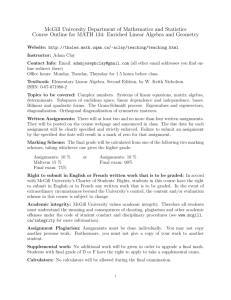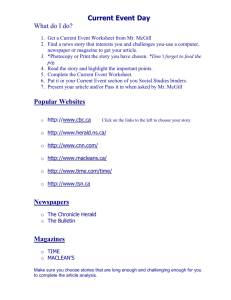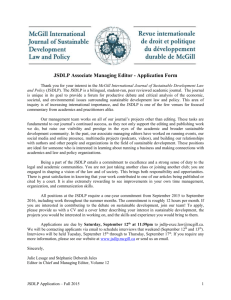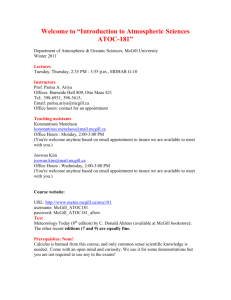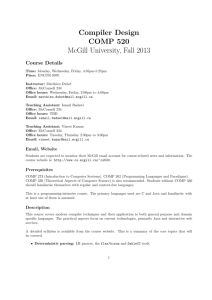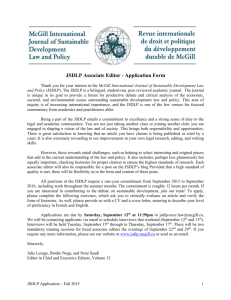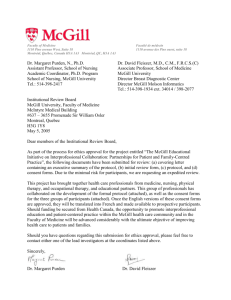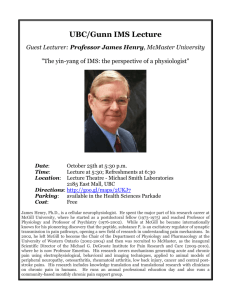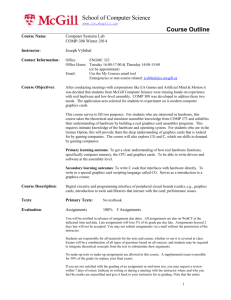Course Outline - CIM
advertisement
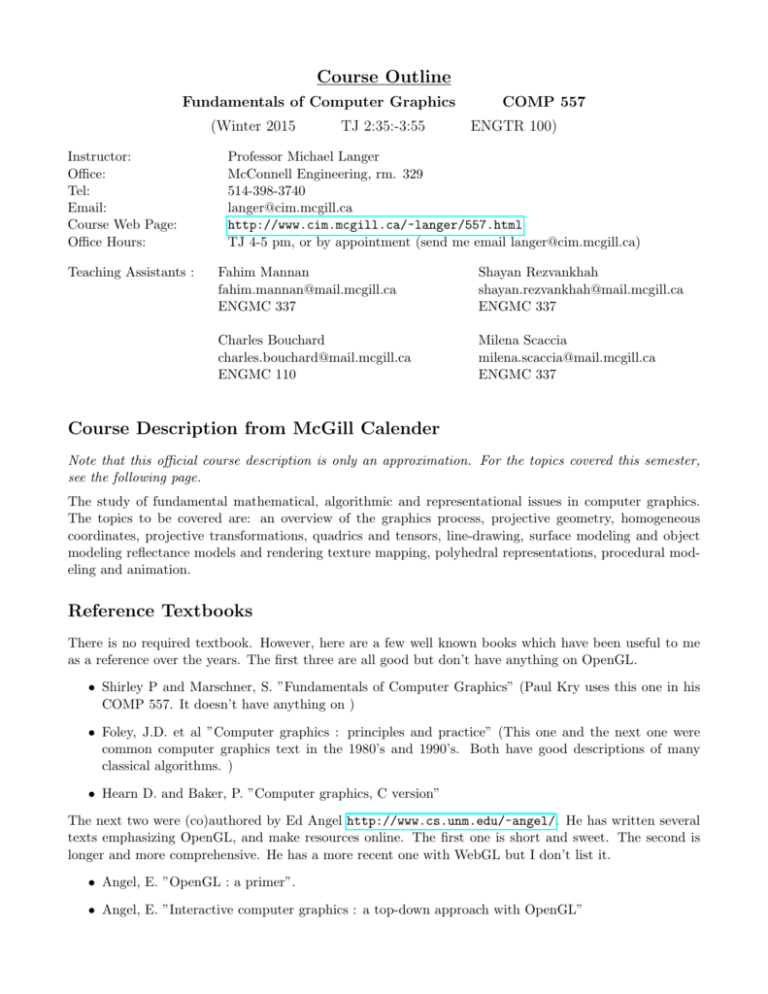
Course Outline Fundamentals of Computer Graphics (Winter 2015 Instructor: Office: Tel: Email: Course Web Page: Office Hours: Teaching Assistants : TJ 2:35:-3:55 COMP 557 ENGTR 100) Professor Michael Langer McConnell Engineering, rm. 329 514-398-3740 langer@cim.mcgill.ca http://www.cim.mcgill.ca/~langer/557.html TJ 4-5 pm, or by appointment (send me email langer@cim.mcgill.ca) Fahim Mannan fahim.mannan@mail.mcgill.ca ENGMC 337 Shayan Rezvankhah shayan.rezvankhah@mail.mcgill.ca ENGMC 337 Charles Bouchard charles.bouchard@mail.mcgill.ca ENGMC 110 Milena Scaccia milena.scaccia@mail.mcgill.ca ENGMC 337 Course Description from McGill Calender Note that this official course description is only an approximation. For the topics covered this semester, see the following page. The study of fundamental mathematical, algorithmic and representational issues in computer graphics. The topics to be covered are: an overview of the graphics process, projective geometry, homogeneous coordinates, projective transformations, quadrics and tensors, line-drawing, surface modeling and object modeling reflectance models and rendering texture mapping, polyhedral representations, procedural modeling and animation. Reference Textbooks There is no required textbook. However, here are a few well known books which have been useful to me as a reference over the years. The first three are all good but don’t have anything on OpenGL. • Shirley P and Marschner, S. ”Fundamentals of Computer Graphics” (Paul Kry uses this one in his COMP 557. It doesn’t have anything on ) • Foley, J.D. et al ”Computer graphics : principles and practice” (This one and the next one were common computer graphics text in the 1980’s and 1990’s. Both have good descriptions of many classical algorithms. ) • Hearn D. and Baker, P. ”Computer graphics, C version” The next two were (co)authored by Ed Angel http://www.cs.unm.edu/~angel/. He has written several texts emphasizing OpenGL, and make resources online. The first one is short and sweet. The second is longer and more comprehensive. He has a more recent one with WebGL but I don’t list it. • Angel, E. ”OpenGL : a primer”. • Angel, E. ”Interactive computer graphics : a top-down approach with OpenGL” Lecture Notes All material covered in the lectures will be made available on-line on the course web page. Topics covered in Winter 2015 Here I have grouped the topics into three categories. For a detailed schedule, please see the public web page: http://www.cim.mcgill.ca/~langer/557.html Geometry • 3D geometric transformations: rotations, scaling, translations • object and scene hierarchies • homogeneous coordinates, viewing transformations, view volumes • projective transformations, clipping coordinates, normalized view coordinates, viewports • hidden surface removal • cubic curves and surfaces • fractals, L-systems, meshes, level of detail Rendering • illumination and reflectance • shading models for polygons • texture mapping and homographies • bump mapping, environment mapping • shadows, interreflections Images • compositing and transparency, volume rendering • color • image capture and display • perceptual issues Prerequisites There are three official prerequisites for the course: • COMP 206 Introduction to Software Systems The assignments may require you to program in C and to use the unix utility make. Alternatively we may use Java or Python this year. A decision will be made within the first two weeks of the course and will be announced. • MATH 223 (or equivalent e.g. MATH 270) Linear Algebra This course will make heavy use of vector and matrices and will also introduce some new concepts in linear algebra. You should have at least a B grade in your linear algebra course in order to follow the material of this course. • COMP 251 Data Structures and Algorithms This prerequisite is mostly there to ensure you have a sufficiently high level of mathematical maturity. A high grade in COMP 250 is probably sufficient though. Although it is not a prerequisite, it is strongly recommended that you have taken MATH 222 (Calculus 3) which is required for CS Majors, or the equivalent. In particular, you need to know what a parametric representation of a smooth surface is, and what a partial derivative is. Evaluation Exams (60 %) There will be two exams, worth a total of 60 % of your final grade. The midterm exam will take place in class on Thursday Feb. 19. It is worth a 20% of your grade. The Final Exam will take place during the Final Exam Period and is worth 40 % of the final grade. The midterm exam will cover the material of lectures 1-12. The final exam will cover the material from the entire course, with more weight given to the material from lecture 13 and beyond. If your percent score on the final exam is greater than your percent score on the midterm exam, then your midterm exam will be ignored and your final exam will be worth 60% of your final grade. Exams will be open book. You can bring as much paper as you want. Electronic devices including calculators, smart phones, laptops/tablets are strictly forbidden. Assignments (40 %) There will be four assignments. Some of these will involve some graphics programming in OpenGL, which is a standard applications programmer interface (API). The assignments will be done in either C, Python, or Java. The decision will be announced within the first few weeks. You will have about 10 days to do each assignment. Late penalty will be 1 % of your final course grade per day up to 3 days. After 3 days, the assignment will not be graded. Here is the planned schedule and points for the assignments. • A1 (10 %): posted after lecture 6 (Jan 23). • A2 (12 %): posted after lecture 12 (Feb 12). • A3 (12 %): posted after lecture 17 (March 12) • A4 ( 6 %): posted after lecture 20 (March 24) Policies/Rules Re-grading: Mistakes can occur when grading. Not surprisingly, requests for re-grading almost always involve those mistakes in which the student received fewer (not more) points than they deserved. With that in mind, note that if you wish me to re-grade a question on an exam or assignment, I will do so but, to avoid grade ratcheting, I may re-grade other questions as well. Bonus points: If you contribute to the course by informing me of errors in the lecture slides, exercises, or assignments, then I will be very appreciative and I will make a note of it. If your final grade is just below some threshold, then your contributions will elevate your grade over that threshold. Final grade: There are many factors that determine your grades including how hard you work, how talented you are in this area, how much time you have available because of other commitments, what your academic background is, what your health situation or family situation is, etc. However, when I assign your final course grade, I do/can/will not take these other factors into account. I assign the final grade only based on your assignment and exam scores. Additional Work: Students with grades of D, F or J will not be given the opportunity to complete additional work to upgrade their grade. Supplemental Exam: It will take place in August. It will cover the same material as the Final Exam and will replace the final exam grade, with the same 60 % option mentioned earlier. For information on Supplemental Exams, see http://www.mcgill.ca/artscisao/general/exams/supplemental/. Cheating/Collaboration: I encourage you to discuss the assignments with each other. But no sharing code ! And your discussion should be public in the sense that anyone including me should be allowed to listen in. McGill’s official policy statement on Academic Integrity: ”McGill University values academic integrity. Therefore, all students must understand the meaning and consequences of cheating, plagiarism and other academic offenses under the Code of Student Conduct and Disciplinary Procedures. See www. mcgill.ca/integrity for more information.” MyCourses Discussion Board I will moderate the discussion board. Please adhere to the following rules/policies: • Be clear: Take an extra minute of your time and make sure that what you have written makes sense. You are broadcasting to a large group, so please respect that. • Be organized: Choose a suitable subject line, and stick to one topic per posting/thread in order to allow easier indexing. • Use the search feature to see if your question has been asked before. • Do not email me with a technical question about the course material. Instead, post the question on the discussion board so that everyone can benefit from the correspondence. • If you would like your posting to be removed – for example, because you realized that your question or comment made no sense – add a request within the thread and I will drop it. No problem. • Be polite.
